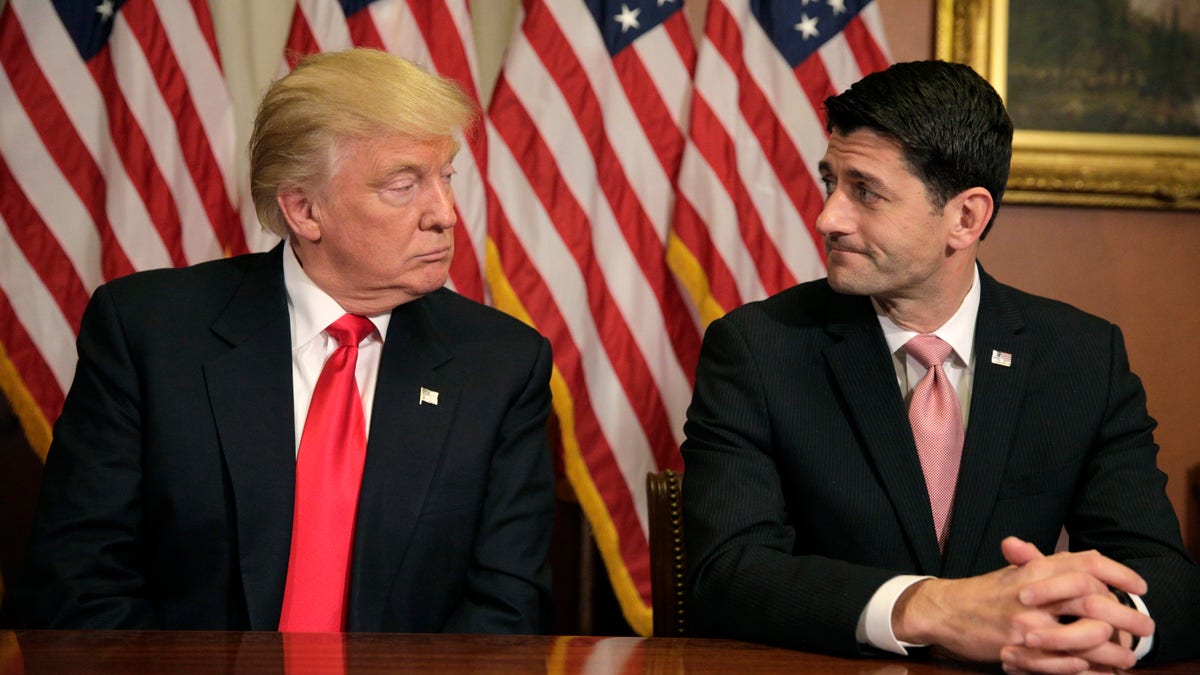
FILE -- November 10, 2016: U.S. President-elect Donald Trump (L) meets with Speaker of the House Paul Ryan (R-WI) on Capitol Hill in Washington. (REUTERS/Joshua Roberts)
In just over a week as president-elect, Donald Trump has done more for peace and economic security than eight years of Barack Obama. They ought to give him a Nobel Peace Prize.
Barack Obama famously received that award less than nine months into his tenure just for creating a “new climate.” Obama undoubtedly helped his case before the Norwegian-based Nobel Committee by not being George W. Bush and for embarking on an apology tour around the world. Before long, the Middle East would be in flames and U.S. interests would come under attack globally, revealing the Nobel Committee’s laughable decision to be just another indication of Old Europe’s moral decay.
NEWT GINGRICH: SEVEN QUESTIONS FOR THE NEW YORK TIMES
Fast-forward eight years and we actually have an incoming president whose mere election has, unlike Obama’s, actually improved America’s security and economy.
Fast-forward eight years and we actually have an incoming president whose mere election has, unlike Obama’s, actually improved America’s security and economy.
Start with North America. Shortly after Trump’s victory, Canada’s left-wing prime minister said he is willing to renegotiate NAFTA, remarking, “It’s important that we be open to talking about trade deals.” Canada’s ambassador added, “We’re ready to come to the table.”
Down Mexico way, President Enrique Pena Nieto, who had the foresight to invite Trump to Mexico City during the campaign, was one of the first to congratulate Trump on his victory and expressed a willingness to negotiate. Trump understands the lopsided importance of Mexico’s continued access to the U.S. economy. Pena Nieto understands that Trump is willing to wield this underappreciated tool of statecraft—unlike any of his modern predecessors. Who knows, Washington could finally get some constructive help from Mexico on trade and illegals.
Turn next to Japan, whose prime minister, Shinzo Abe, is coming to New York for an unprecedented meeting with the President-elect. Contrary to media predictions, don’t expect Abe to cry over spilt milk regarding the Trans-Pacific Partnership, which is now as dead as Julius Caesar. Instead, Abe will search for common ground, especially on security. Many in Tokyo actually welcome Trump’s admonition that allies should spend more on their own security, and pressure from Washington could help a Japan threatened by China and North Korea raise its defense spending from just one percent of GDP to substantially more.
Russia has also changed its tune with Trump’s election. Hillary Clinton’s “reset” of relations with Moscow failed because it was based on pageantry instead of national interests, and it conveyed weakness. Trump projects the strength that Putin respects and is willing to explore common interests with Moscow like fighting ISIS in Syria—an obvious step that is somehow beyond comprehension by preening moralists of both parties in Washington who demand war against the regime of Bashar al-Assad.
Trump has also heartened those who contemplate the future of the U.S. economy. Experts who predicted a collapse in the stock market if Trump won were as wrong as pollsters and media pundits about the election. There is a growing expectation that the economy will eventually return to normal growth after a lost decade of malaise. This confidence is self-reinforcing, drawing out investors and businesses who can now plausibly hope that Obamacare and other adventures in central planning and hyper-regulation will soon be just a bad memory.
The odd man out from the improving diplomatic and economic picture is Old Europe, typified by Jean-Claude Juncker, the arrogant boss of the EU, who remarked that, “We will need to teach the president-elect what Europe is and how it works.” He added, “I think we will waste two years before Mr. Trump tours the world he does not know.” These statements aren’t just insults to Trump, who actually has extensive business experience in Europe, but to the American people and their decision.
No matter. European globalists and multiculturalists like Juncker face their own reckoning with voters. Britain won’t be the last country to opt out of the EU and its slow economic and cultural euthanasia at the hands of central planners and Islamists.
The outlier of consequence is of course China, which is almost as upset as the mainstream media about Trump’s election. A Chinese government mouthpiece threatened U.S. universities with the withdrawal of Chinese students and also said Silicon Valley companies like Apple and other giant corporations would suffer if the trade status quo were altered—a radical overestimation of the debt Trump owes to academia, tech, and Wall Street, which is precisely zero.
Regardless, the Pacific still became instantly safer when Trump’s victory was sealed. Trump’s election means that Washington finally rejects the myth that trade will tame China’s communist regime. Resolve can be contagious, especially when it’s demonstrated by the president of the United States. Trump’s election indicates that America and our allies will expend more on defense and dispense with dangerous wishful thinking about China, its aggression, and its military buildup.
The situation is similar to when Ronald Reagan won the presidency. His election also made the world safer before he did anything in office, with a concerned Iran releasing the American diplomats it held hostage on Reagan’s first day in office. His approach to the Soviet Union, which involved a similar mix of clarity and resolve, resulted in one of the most peaceful decades for America in history and ultimate victory in the Cold War.
No, Donald Trump won’t really be a candidate for the Nobel Prize any more than Reagan was. But both men did more for peace and prosperity in the days after their elections than Obama did in eight lousy years. There ought to be a prize for that.








































